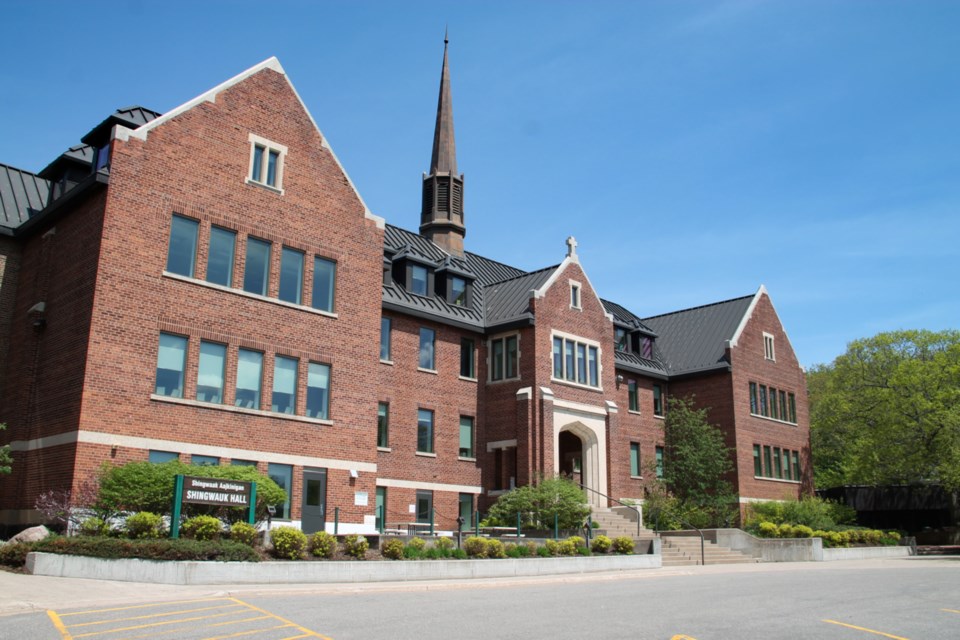It’s a simple idea.
Local students helping local students succeed and enter university with confidence is the mission of the Algoma Connect Program.
The program employs Algoma University students who tutor high school students in any grades 11 and 12 math classes at both local school boards.
It’s similar to parents or older siblings helping kids with school work and it’s free.
However, unlike frustrated parents trying to understand today’s math, the university tutors excel at the subject. They’ve received training on how to best instruct their students and are paid through a special grant.
Of course, the concept of tutoring isn’t new, but this program couldn’t have come at a better time.
“I would say the pandemic has certainly been the catalyst for us to get this program off the ground,” said Darren Vaughan, who supervised the program since it began tutoring its first student on May 25. “When they announced the on-line format at the high schools, we as an institution identified an area of need.”
The program zeroes in on grades 11 and 12 students.
“Obviously we have a vested interest with that group of students. They are finishing their senior years of high school and many will be coming to see us at Algoma University,” said Vaughan.
Regardless of a student’s future plans, Vaughan emphasizes the goal is to help local students and give them confidence as they continue learning.
“The mainstay of this program is supporting the high school students,” said Vaughan. “We could see they were going to need it.”
The program’s pioneers have an education background.
Vaughan is a high school math teacher and Algoma University President Asima Vezina was a past superintendent at Algoma District School Board.
“The school boards have been absolutely phenomenal to us with this program,” added Vaughan.
Current research has shown tutoring makes a big difference in student success.
According to a story in University of Toronto News, economics professor Philip Oreopoulos suggests that one-on-one and small group tutoring consistently improves academic achievements, offering important insight into ways to assist students struggling during the COVID-19 pandemic.
The story cites a Harvard Kennedy School study done in partnership with three Italian universities. Volunteer tutors from the universities were randomly paired with students in schools recommended by their principals. The tutors received training online and provided three hours of weekly tutoring for two months. The students showed significant academic improvement in math, English and Italian, as well as improvements in non-academic outcomes including mental health and life satisfaction, as reported by the students, their parents and teachers.
At the moment, the Algoma Connect Program deals strictly with math, but there is a possibility to open it up to other subjects in the future.
Math is one of those subjects that can be particularly daunting. The upheaval caused by COVID adds to the challenges.
“It’s obviously a core program. In the past, studies have shown if you don’t get that support it is a course you can fall behind in quickly,” said Vaughan.
Currently, 20 students being tutored. There are now nine tutors in the program, but that number can grow with the need.
Vaughan sees signs of growing interest.
“With the quadmester we are seeing this program as even more important. These students are now cramming a full term into two months. The second quadmester has just started,” he said.
“We are offering this lifeline to students. There’s no charge to you and no charge to the school boards. Let us help. There’s really no cap on the hours.”
The program has worked with some students for five hours a week and it can even be used if a student is having problems with a specific discipline of math like trigonometry or algebra.
“If a student needs help the student is going to get it,” said Vaughan.
Any interested high school student just needs to email [email protected] and ask for help. They need to state in the email what type of math they need help with so that they are matched with a tutor who specializes in that area.
The tutoring is virtual. The student will need a personal gmail account (they will be provided this information once they send the initial email).
“Our plan is to keep this rolling,” said Vaughan, when speaking about the program’s future. “We have approval now to run the program to the end of May.
An analysis will be done in the new year to look at the feasibility of moving the program into a full time or long-term basis.
